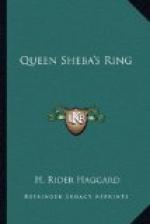“O Walda Nagasta, and you, white men, sons of great fathers, I have listened to the talk between you and my servants; I confirm their words and I add to them. I am sorry that my generals tried to kill you last night. I was making prayer to my god, or it should not have happened. I have been well repaid for that deed, since an army should not make war upon four men, even though by their secret power four men can defeat an army. I beseech you, and you also, Rose of Mur, to accept my proffered friendship, since otherwise, ere long, you will soon be dead, and your wisdom will perish with you for I am weary of this little war against a handful whom we despise.
“O Walda Nagasta, you have breathed threats against the Majesty of Harmac, but he is too strong for you, nor may the might that can turn a few bricks to dust and shatter the bones of men prevail against him who is shaped from the heart of a mountain and holds the spirit of eternity. So at least I think: but even if it is decreed otherwise, what will that avail you? If it should please the god to leave us because of your arts, the Fung will still remain to avenge him ere they follow. Then I swear to you by my majesty and by the bones of my ancestors who sit in the caves of Mur, that I will spare but one of the Abati Jews, yourself, O Child of Kings, because of your great heart, and the three white men, your guests, should they survive the battle, because of their courage and their wisdom. As for their brother, Black Windows, whom I have captured, he must be sacrificed, since I have sworn it, unless you yield, when I will plead for his life to the god, with what result I cannot tell. Yield, then, and I will not even slay the Abati; they shall live on and serve the Fung as slaves and minister to the glory of Harmac.”
“It may not be, it may not be!” Maqueda answered, striking the pommel of her saddle with her small hand. “Shall Jehovah whom Solomon, my father, worshipped, Jehovah of all the generations, do homage to an idol shaped by the hands He made? My people are worn out; they have forgot their faith and gone astray, as did Israel in the desert. I know it. It may even happen that the time has come for them to perish, who are no longer warriors, as of old. Well, if so, let them die free, and not as slaves. At least I, in whom their best blood runs, do not seek your mercy, O Barung. I’ll be no plaything in your house, who, at the worst, can always die, having done my duty to my God and those who bred me. Thus I answer you as the Child of many Kings. Yet as a woman,” she added in a gentler voice, “I thank you for your courtesy. When I am slain, Barung, if I am fated to be slain, think kindly of me, as one who did her best against mighty odds,” and her voice broke.
“That I shall always do,” he answered gravely. “Is it ended?”
“Not quite,” she answered. “These Western lords, I give them to you; I absolve them from their promise. Why should they perish in a lost cause? If they take their wisdom to you to use against me, you have vowed them their lives, and, perhaps, that of their brother, your captive. There is a slave of yours also—you spoke of him, or your servant did—Singer of Egypt is his name. One of them knew him as a child; perchance you will not refuse him to that man.”




